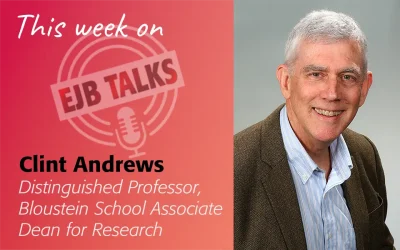The unemployment numbers in this first month of the COVID-19 pandemic have been staggering. What can we do to help those who are finding themselves newly unemployed, desperately waiting for their benefits to start and not sure where to turn? In this episode of EJB Talks, our host Stuart Shapiro, Associate Dean of Faculty and Professor of Policy at the Bloustein School, talks to Carl Van Horn, Distinguished Professor at the Bloustein School and Director of the John J. Heldrich Center for Workforce Development, on the dangers of long-term unemployment, who is most vulnerable, and the services the Heldrich Center can provide, along with the State of New Jersey, to help people traverse through the economic crisis brought upon us by COVID-19.
Stuart Shapiro
Welcome to this episode of EJB Talks. I’m Stuart Shapiro, the Associate Dean of Faculty at the Bloustein School, and the purpose of this podcast is to talk with my colleagues about issues affecting people in New Jersey, the United States, and the world.
Last week we talked about the effect of COVID-19 on our hospitals. Today, we turn to another crisis spawned by the virus, the crisis of large scale unemployment. Today, I’m talking with Distinguished Professor Carl Van Horne from our Public Policy Program, and the director of the Heldrich Center for Workforce Development. Carl, thanks for taking a few minutes to speak with us today.
Carl Van Horn
Thanks for inviting me, Stuart.
Stuart Shapiro
Can you tell us a little bit about the Heldrich Center and what it does?
Carl Van Horn
The Heldrich Center focuses on workforce development strategy and policy, using research to ferret out the most effective programs. It provides advice to policymakers at the state and national levels and also assists nonprofit organizations and private businesses as they try to adjust to economic changes, which obviously we’re right in the middle of a huge one right now.
Stuart Shapiro
Yes, this is about as big an economic change as we’ve seen, maybe in my lifetime. Because of this economic change, we’re seeing a lot of people losing their jobs. Which demographic groups are particularly vulnerable to losing their jobs?
Carl Van Horn
Well, from a demographic standpoint, unfortunately, it extends what is already a difficult struggle for many people who have limited education and skills. So, those obviously tend to be low-income groups, disproportionately minorities, and individuals who work part-time–contingent work as we call it. So, they are being punished again in this recession, as they always are. The only exception to that is some of those individuals are working in positions of great vulnerability personally to their health, which is in healthcare settings, home health care, and in some cases in grocery stores and convenience stores. But by and large, the general trend has been folks who already had a low-income job, and now, many of those jobs have been at least eliminated on a temporary basis.
Stuart Shapiro
The Heldrich Center has done a lot of work on long-term unemployment. With businesses shutting their doors, maybe permanently, that seems like a particular threat right now. Can you talk a little bit about long-term unemployment and what makes it so dangerous for workers?
Carl Van Horn
Sure, I mean, first of all, long-term unemployment, we tended to find that is a period extending beyond the first six months of unemployment because, in most states, including New Jersey, there is unemployment insurance, at least for part of the population, the lasts for about six months. But beyond that, if you don’t get a job during that first six months or beyond that, of course, you have no income. And then secondly, often employers attach a stigma to people who’ve been out of work for a long period of time. This we discovered during our research on the Great Recession, and it’s not a necessarily a fair stigma in any way. But if employers think that if there’s a gap in your resume, perhaps that’s indicative of your lack of employability.
The second thing I would say about it is that–while I’m not a psychologist–but psychologists tell us that unemployment in general, and so then long term-unemployment, is one of the most significant traumas that people face in their lives. Whether comparable to the loss of a loved one, or a serious illness. It leads to despair, mental health problems, sometimes alcohol and drug abuse. So all of those are not only financial but also psychological and health problems.
Stuart Shapiro
Right. You mentioned the unemployment insurance. Was that extended in the last stimulus bill, the past Congress?
Carl Van Horn
What happened in the most recent activity was the unemployment insurance was enhanced. So in other words, people would get an extra $600 above what their state is providing to them. States vary in the generosity of their unemployment insurance benefits, and in the duration of them all. As I said most are 26 weeks, but some are less. Some states pay a couple of hundred dollars a week. Maximum in New Jersey, it’s well over $600. So but again, on top of that, the federal government is adding $600.
Now it’s also important to say for the listeners that not everyone is eligible for unemployment benefits. If you don’t work for a certain number of hours for a long period of time, or certainly if you’re not working “on the books,” as we say, paying taxes for it. For an employer that doesn’t pay taxes, then you’re not eligible. So there’s a good 30% of the workforce isn’t even eligible for these in the first place.
Stuart Shapiro
Wow. Even for those eligible, we’ve heard about a lot of difficulty in filing for unemployment benefits–backlog, software problems, etc. What is being done, if anything to make it less burdensome for people to file?
Carl Van Horn
To give you a sense of the problem, the scope of it, the demands or requests for unemployment benefits increased week over week 16-fold, the largest increase and the largest number of people applying for unemployment insurance benefits in a single week in the history of the program, which goes back to 1935. So obviously no one was prepared, and no matter what kind of contingency planning, no one ever prepared for that; it wasn’t like that during the Great Recession. So, what people are encountering is the difficulty of adjusting to that. A lot of technology that just can’t cope with that sort of demand.
And then individuals who work for the unemployment insurance agencies are suddenly being shifted from an in-office setting to a remote setting because of social distancing, and maybe even unable to work from home because they don’t have the right technology because of security issues, because of people’s social security numbers and so on. So, all of that adds up to a really unpleasant, difficult situation. People are getting paid and getting checks, but not as quickly as they’d like. And so, what I say to people is, you have to be patient even in this difficult situation and keep trying. And one cautionary note, it’s very important–never engage in a conversation about your unemployment insurance benefits or your social security number with anyone other than a person in a government agency.
Scams and internet scams and so on are already popping up with people saying, ‘Hey, I can get your benefits more quickly, just give me your social security number, and pay a small fee, and I’ll make it happen.’ So again, unfortunately, with crises come along unscrupulous, fraudulent, and criminal behavior. And we’re seeing it already.
Stuart Shapiro
Right. I saw this morning, someone projected the unemployment rate might be as high as 15% really soon.
Carl Van Horn
Yeah, I wouldn’t be at all surprised. I mean, we already know there are at least 17 million additional people unemployed than there was three weeks ago. So that’s already more than 10% of the labor market. So, I would definitely expect it would continue to rise.
Stuart Shapiro
What other questions about the labor market is Heldrich focusing on in light of the COVID-19 crisis? Anything particular in New Jersey that we should know about?
Carl Van Horn
Well, sure, we’re doing a couple of things. I mean, first of all, we’re working with the Office of Innovation, the New Jersey Office of Innovation to provide more digital coaching and virtual coaching. Both of those are very important. So beyond the application for benefits, the next question that people face is okay, how do I reposition myself to get another job? What are the opportunities? How could I, if necessary, get the training I need to do that? Where do I look? How do I make my resume more appealing, etc? For many years, we have had a program privately funded program to work long term unemployed older workers.
So what we did, as this crisis unfolded, was open that up to anyone who’s unemployed in New Jersey, to obtain the digital services that we’re providing and the state is providing, which include a wealth of webinars and digital tools to help people cope with both the job search process; but also, as I mentioned before, some of the mental health struggles. And lastly to link to the various benefits that they’re entitled to, whether it is food stamp programs, or health care programs, or other services, so that they can in a single way begin to understand what can really help them through this crisis.
Stuart Shapiro
Wow. And you’re able to do all that digitally or remotely so people can access these programs from their homes?
Carl Van Horn
Yes, that’s right. And again, one of the ways in which people typically did access these services was at their home, but others went to community settings, libraries, community- based organizations and so on. That obviously in the short run is not possible. But as the crisis eases a bit, we hope that they’ll be able to do that again. We also have call-in Zoom sessions that people can call into; they’re all posted on our website. They happen at least once a week. There’s a lot of group coaching that we’re able to do. And again, what we’ve done is expand the services we are already providing. And we’ve been doing this for five years and already served over 5000 people that way. But in the current environment, we have to scale up substantially.
Stuart Shapiro
Well, that’s great stuff. Let me ask you to put on your hat as an experienced public policy professional and talk for a little bit about–from a public policy perspective–what should state governments like the New Jersey government and the federal government be doing right now, and over the next six months, to deal with what looks like it’s going to be the most severe recession since the Great Depression?
Carl Van Horn
Let me work backward with your question, with the federal government, Stuart. Because the state governments are facing their own fiscal crisis and cash flow issues. So the federal government, as I’m sure you know, is the only government that can print money and could borrow unlimited amounts of money essentially.
And they’ve already started doing that. And they have to continue doing that because the depth of this crisis is way beyond the Great Recession levels. And, they need to do that to support state governments to provide the services that they need to provide to their residents. So, we need more support from the federal government. I have also recommended community service emergency employment jobs, which go beyond obviously unemployment insurance. Most people would rather not sit at home and collect the benefit check, they would like to be doing something. They want to be contributing. There are great deeds in the community, whether it’s food banks or other services to even lower-income people that need help that many people could do in the short run. And the federal government’s the only place that can support that. This happened in the 1970s, under President Nixon and Carter, so bipartisan. It also happened, of course, during the Great Depression, as many people know. So that’s another strategy that we need to add to our toolkit I believe, as well as block grants to state governments from the party on the part of the federal government.
At the state level, what we need to be doing, in addition to managing the health crisis carefully and returning to work so that it doesn’t spike again, is to accelerate as much as we can the infrastructure investments that many private and public entities were already planning to do over the next period of years. And so an inventory that is I think being compiled; it’s very important to do that because that will put lots of people back to work. Again, it’s not just construction workers with big equipment. Of course, that is part of it.
But as you know, of course, as you build an apartment building, then people have to fill it with furniture and refrigerators and so on and so forth and for people, it engenders more purchasing. And that, obviously, continues to stimulate the economy and provide services to people. And the same thing is true as we build more businesses.
I think we also need to be reaching out, to continue to reach out to other countries who may be interested in relocating to the United States because again, the U.S. remains a safe and profitable place for many businesses in other countries. And I think that that needs to continue because foreign direct investment is another thing that will help stimulate the economy here in New Jersey. And I think, you know, last but not least, state government needs to focus, as I’m sure it will, on those most vulnerable people who are struggling economically, and in a health sense recovering from their infections so that they can become fully capable again, as the economy recovers.
Stuart Shapiro
Great– you mentioned infrastructure there, and that has always seemed to me to be the big win-win. I mean, this administration at the federal level talked a lot about it. At the beginning of the administration, there was a running joke about infrastructure week never actually happening. But it does seem like that is something where we can both put people to work and make needed improvements throughout the country.
Carl Van Horn
Yes, I believe it was Winston Churchill who said that crisis is a terrible thing to waste or something to that effect, either he or somebody else. But anyway, it’s a great thought because when you have a crisis, it’s the opportunity to, as you work through the misery and pain of it, say, ‘Okay, what can we do to reposition ourselves to be stronger in the future.’ And one clear way to do that is to meet our infrastructure needs–the Gateway Project, which many people may know about, that helps connect New Jersey and New York together economically to move people back and forth. An absolutely essential project for the safety and growth of the country. And many other projects–water systems, departmental investments–all of these will make New Jersey stronger and the nation stronger if we invest in them. So I think we absolutely need to be thinking in that direction and doing the policy changes and not waiting for another six months or nine months until the next administration is supporting it.
Stuart Shapiro
Right. So anything I should have asked you, anything I missed about the labor markets and the increasing unemployment?
Carl Van Horn
No, but I think the one thing I would say is that, you know, buckle your seatbelt, it’s going to look bad for the next few months. What we hope is that the combination of taming or mitigating the virus and the infections begins to be successful. And when that happens, as Governor Murphy said, when the health recovery happens, then the economic recovery will follow.
Stuart Shapiro
Great. Well, a big thank you to Professor Van Horn for appearing today. And also to our production team, Tamara Swedberg, Amy Cobb, and Karyn Olsen. We’ll be back next week with another talk from another expert from the Bloustein School. Thanks, Carl.
Carl Van Horn
Thank you, Stuart.




